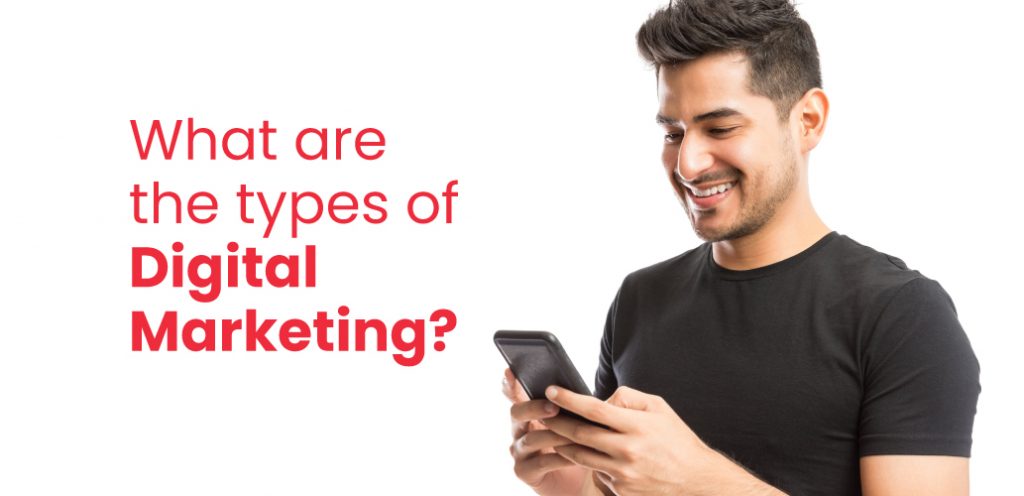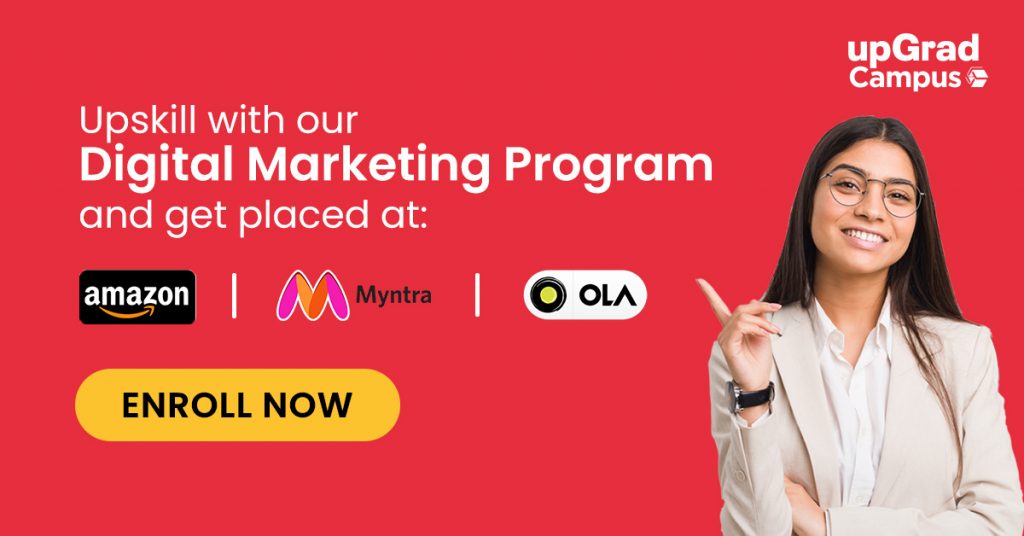Blog > upGrad Campus’s Ultimate Guide on Digital marketing
upGrad Campus’s Ultimate Guide on Digital marketing
December 12th, 2022

Table of Contents
- What is Digital Marketing
- What are the types of Digital Marketing
- Importance of Digital Marketing
- Digital Marketer Skills That Freshers Need
- Digital Marketing Career Opportunities
- Digital Marketing Job Trends in India
- FAQ
- Conclusion
Instagram reels, Facebook shares, Influencers. Do you think this is all there is to Digital Marketing? You’re in for a surprise, pal!
Luckily for you, we have the ultimate guide on Digital Marketing that will help you understand where you stand and where you need to go in the long and ever-changing field of Digital Marketing. This blog covers everything you need to know about Digital Marketing, starting with the most important question - what is Digital Marketing?
What is Digital Marketing?
In today’s world, it’s impossible to find a person who wouldn’t have been subjected to Digital Marketing at all. But while everyone has been exposed to it, not everyone understands the meaning of Digital Marketing.
Digital Marketing is an umbrella term covering a single or a combination of activities which allows brands to connect with their customers/target audience. Simply put, it covers any piece of online communication - email/social media ad/search engine result, etc. - that allows users to find and connect with a brand.
Sounds confusing? The best way to understand what Digital Marketing is is by exploring the different Digital Marketing channels.
What are the types of Digital Marketing?

There are many types of Digital Marketing channels. The most widely used ones are:
Social Media Marketing (SMM): A Digital Marketing type that is most recognizable is perhaps Social Media Marketing. Social Media Channels like Facebook, Instagram, YouTube, Linkedin, Twitter, etc. are used to build brand awareness amongst your target audience and to interact with them, sometimes, in a one-to-one manner.Search Engine Optimization (SEO): This type of Digital Marketing involves building searchable content on your website and other web pages. The end goal is that your brand name should appear on top of the Search Engine Results Page (SERP), when users search for particular keywords in Search Engines like Google, Bing, etc. Let’s face it - nobody really looks at any results beyond the third page. So the idea is that your brand should make an appearance as early as possible on the first page itself.
Pay Per Click Advertising (PPC): You must have seen several ads in the form of images, banners and sometimes occurring as search results when you search for a particular topic. These are all forms of PPC. In this Digital Marketing type, the brand pays the website/search engine where the ad is displayed, only if the viewer clicks on the ad. Hence, the name Pay Per Click.
Email Marketing: Email has been and continues to be one of the most powerful tools in Digital Marketing. It has widespread reach, is easy to design and versatile enough to include all types of content. That is why brands make use of email marketing to communicate with their audiences.
Affiliate Marketing: In affiliate marketing, brands pay a commission to affiliates to talk up the brand’s product or service on the affiliate’s website. The affiliate could be an individual or another company itself.
Although there are new channels that are evolving every other day, most of them fall under one of the above 5 types of Digital Marketing.
But, we still haven’t addressed a very important question yet - why is Digital Marketing important?
Importance of Digital Marketing
To understand the importance of Digital Marketing, one must understand what are the benefits of Digital Marketing. There are many benefits of Digital Marketing, for brands and individuals alike:
- Owing to the fact that the internet is accessible to everyone and is not restricted to locations, brands are able to reach a larger audience via Digital Marketing.
- One of the most important benefits of Digital Marketing is the ROI. With even a small budget, you can reach a larger audience.
- When it comes to traditional marketing vs. Digital Marketing, you can directly measure the results of a Digital Marketing campaign, which the former does not allow for.
- With Digital marketing, you can perform A/B testing. You can run two campaigns - campaign A and campaign B - each across a small set of audiences and see which one performs better. You can then scale up the campaign to a larger audience.
- Digital marketing allows consumers to find and connect with their brands on a one-on-one basis.
- Digital marketing employs a diverse set of skills - creativity, communication, design, technology, problem-solving, data analysis and more, thereby offering a range of job opportunities.
Digital Marketer Skills That Freshers Need
For every type of Digital Marketing channel, there is a range of skills to learn. It can be quite daunting for a fresher to understand which skills to pick up, especially considering that Digital Marketing trends change by the day.
As a general rule of thumb, you should familiarize yourself with:
- Data Analysis:
As mentioned earlier, you can measure the performance of Digital Marketing campaigns. So data is something you will be constantly working with. You need to have the ability to clean data, analyze data (e.g. user demographics), derive meaningful insights and present them in a way that is easy to make marketing decisions.
Tools & Platforms to know: Google Analytics, MS Excel, and more.
- SEO & SEM: In their own right, both Search Engine Optimization (SEO) and Search Engine Marketing (SEM) help brands to rank higher on Search Engine Results Page (SERP). Whereas SEO focuses on doing so with free content like the brand’s own website, backlinks, etc. SEM achieves this objective with paid promotions.
Tools & Platforms to know: Google Ads, SEMRush, Google Analytics, SEPSitecheckup.com, Serpstat and more.
- Social Media Marketing (SMM): In marketing there is a popular saying - be where your customers are. And that is exactly what social media allows brands to do. Social media initially began as a simple platform for people to connect with one another. But in the hands of Digital Marketers, it has expanded to so much more. Today, social media marketing includes regularly posting quality content on the various (and relevant) channels, running YouTube/Instagram/Facebook/Linkedin ads, collaborating with influencers, online reputation management by way of responding to comments and queries, and so much more.
Tools & Platforms to know: Facebook Ads Manager, Twitter Analytics, Hootsuite, Mention, Tweetdeck and more.
- Content Creation: What is a digital marketing strategy that is more important than the others? In a word, content! There is a reason why they say Content is King. If your content doesn’t have the ability to attract your audience, then all other Digital Marketing efforts are pointless. As a Digital Marketer, you will be expected to understand various types of content (blogs/video scripts/ebooks/social media content, even email), and have a solid foundation in at least a couple of these.
Tools & Platforms to know: WordPress, Mailchimp, Inshot, Canva, etc.
- Communication & Visualization skills: As a Digital Marketer, it is expected of you to have superior communications skills and the ability to visualize ideas. Your language skills need not be restricted to English alone. As marketing strategies are evolving in multiple languages, it helps to have a good grasp of one or more regional languages. Further, you must also have an eye for design aesthetics so that your campaigns perform well.
Skills to know: Graphic Designing, Writing
Seems a lot? Take a deep breath and let go. Then rest assured that all these skills are easily learnable at upGrad Campus. Our Digital Marketing Certification course teaches all of the above and more!

Just some of the benefits of Digital Marketing course offered by upGrad Campus include:
✔ Designed and structured for beginners✔ You can self-study at your own pace and get help from mentors when needed
✔ You get exposure to industry experts
✔ You can work on projects on SEO/SEM/SMM/Web Analytics/WordPress and more!
✔ You get lucrative placement and career opportunities in the field upon completing the course
Digital Marketing Career Opportunities

As of 2020, the Digital Marketing sector was valued at a whopping 353 billion dollars. There is practically no brand today that doesn’t have an online presence. So the opportunities available to a Digital Marketer are as many as there are brands, organisations and marketing agencies today!
What is a Digital Marketer career path?
The skills you pick up and choose to specialize in determine your career path as a Digital Marketer. In general, the career path of a Digital Marketer looks as follows:
- SEO Specialist → SEO Manager → Digital Marketing Director
- Search Engine Marketing Specialist → Digital Marketing Specialist → Digital Marketing Manager
- Social Media Specialist → Social Media Manager → Communications Director
- Email Marketing Specialist → Marketing Research Analyst → Digital Marketing Lead
- Copywriter → Content Strategist → Content Manager
You can learn more about the Digital Marketing Career Path from an experienced Digital Marketer herself. Check out our Masterclass recording by Archna Lalwani, a Marketing Consultant from IIM Indore as she covers the various opportunities available to you as a Digital Marketer.
Digital Marketing Job Trends in India
To know which skills you should be focussing on, you also need to be aware of the latest Digital Marketing trends in India. Some of the changes that are expected in this thriving field are:
- Personalization will be key. Today more and more users are looking for a personalized experience as they connect with brands. To deliver this personalized experience, brands will heavily depend on AI for Chatbots, automation in email marketing and more.
- NFTs and Cryptocurrency. Non-fungible tokens and cryptocurrency will find their application in digital marketing, with brands using these digital assets for accepting payments and as giveaways.
- Metaverse will be bigger than ever. As more users start building their online presence in the Metaverse, brands will also try to occupy as much real estate as possible, and what will follow is Digital Marketing.
- Voice assistants everywhere. Alexa, Siri and Google Assistant won’t be the only players on the field. Voice assistants may end up being the default way to search and interact with brands.
- AR and VR. AR filters have already found their way into Instagram. Brands will explore new ways to engage audiences with both Augmented and Virtual Reality.
Digital Marketing Frequently Asked Questions
- How is Digital Marketing different from Inbound Marketing?
It is easy to confuse Digital Marketing with Inbound Marketing as both are closely related. However, the objective of each of these types of marketing is different. This in turn makes the strategy of Digital Marketing very different from that of Inbound Marketing. Inbound marketing is all about building experiences and content that attracts customers to the brand. This may seem similar to Digital Marketing which also relies on content and experiences to attract customers to the various channels. However, where Digital Marketing works towards specific platform goals (e.g. getting impressions on social media channels), Inbound Marketing is a more holistic approach to getting qualified leads. Put this way, Inbound Marketing uses Digital Marketing tactics to meet its milestones across digital channels. - What is the difference between B2B and B2C marketing?
B2B marketing refers to Business-to-Business marketing, where one business’s client is another business. Examples include manufacturers of car parts with clients such as an automobile company or perhaps an IT company that sells its software to banks and other institutions. In B2C marketing, the client is always an individual. Many businesses, like restaurants, clothes brands, and even services like Ola and Zomato cater to individuals and are inherently B2C in nature.
Until a few years ago, B2B relied more on interpersonal relationships than concentrated marketing efforts to get more clients. But with the explosion of Digital Marketing and technology, B2B brands rely equally on Digital Marketing to the same end.
Because their audiences are drastically different, there is a lot of contrast between B2B versus B2C Digital Marketing. Since most B2C offerings are short-term buys, B2C messaging tends to be catchy and offer-based with an emotional connection to the consumers. B2B brands on the other hand expect a long-term relationship with their customers and hence, they tend to be more evidence-based offering long-term benefits to the consumers. Where B2C content has to be more “talkable/memorable” amongst the consumers to attract them, B2B content has to be more “downloadable/shareable” for executives to make decisions. So you have to design your marketing strategy, creatives and campaigns according to your audience - whether it is B2B or B2C. - Will Digital Marketing thrive in the recession?
This is a common question that occurs in the life of every marketer. Marketing for businesses is an expense, and come recession, cutting marketing budgets seems like a reasonable action. However, Digital Marketing has changed the game for businesses. Digital marketing allows you to perform many activities - generating new leads to bring in new business, remarketing to old leads, building revenue through easy shopping avenues and more. Each of these objectives are achieved with much smaller budgets and a well-defined target audience, making the marketing expenses very low compared to traditional marketing avenues. So Digital Marketing is definitely the need of the hour during a recession.
Furthermore, considering that technology is not moving out of our day-to-day lives anytime soon, nor will Digital Marketing. This means that there is abundant scope for brands to employ Digital Marketing professionals to come up with new touchpoints for interacting with their consumers.
Conclusion

Digital Marketing is a thriving industry with abundant opportunities. It expects little from you in terms of background and gives you the chance to explore newer strategies, skills and audiences and flex your creative side too! If you’re interested in becoming a full-time Digital Marketer, then our Digital Marketing Certification Program is just the place to start. With marketing experts from popular brands, one-on-one mentoring, hands-on projects and more, this course is the perfect stepping stone for your career.
Was there something more you wanted to know about Digital Marketing? Let us know in the comments below.






Add a Comment